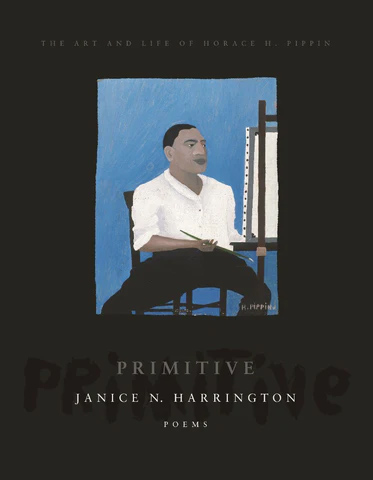Primitive
The Art and Life of Horace H. Pippin
 Buy the Book: BOA Editions Ltd, Bookshop, Amazon, Apple Books, Barnes & Noble, Books-A-Million
Buy the Book: BOA Editions Ltd, Bookshop, Amazon, Apple Books, Barnes & Noble, Books-A-MillionPublished by: BOA Editions Ltd.
Release Date: October 11, 2016
ISBN13: 978-1942683209
Overview
A lyrical and biographical reflection on the art and life of Horace H. Pippin—the best-known African American artist of his time—Primitive offers a searching critique of the condescension to African American folk art as supposedly “primitive,” and it also critiques the underestimation of African American life and imagination in the broader American consciousness. Award-winning poet Janice N. Harrington connects readers to this fascinating, odds-defying artist, all while underscoring the human craving for artistic expression.
Praise
“In her innovative and incisive third book of poems, Primitive, Janice N. Harrington shows us the great revelations possible in the intersections of history and poetry. These elegantly-crafted poems explore the aftermath of war, Jim Crow America, and American visual art through the life and art of the painter Horace H. Pippin. This collection is both a historical reflection and an ekphrastic object, masterfully rendered from found texts, paintings, notebooks, and the ephemera surrounding the painter and his work. It is through Pippin’s pictures and pigments, both paint and skin, that we see the complex beauty of the artist—a beauty that announces itself in bold colors in spite of the bigger machines of oppression that so often worked in opposition to his artistry.”
—Adrian Matejka
“In Primitive, the artist Horace H. Pippin is less a lens and more a prism through which Janice N. Harrington watches humanity with a careful eye. Harrington’s skill with image is undeniable, and her ability to intertwine ekphrasis, biography, history, and interior landscape results in a text that is much more than a book of poems without ever ceasing to be a moving and radiant example of one.”
—Jamaal May
"This collection not only recalls specific paintings by Pippin but returns to the ideas of satisfaction emerging in the process of painting, and painting exactly what he saw. These two recurring ideas lend weight to his experiences as a veteran during the Jim Crow era. Harrington gracefully honors Pippin’s words and work through her spare lines, strong sense of narrative, and subtle sonic repetitions."
—Publishers Weekly